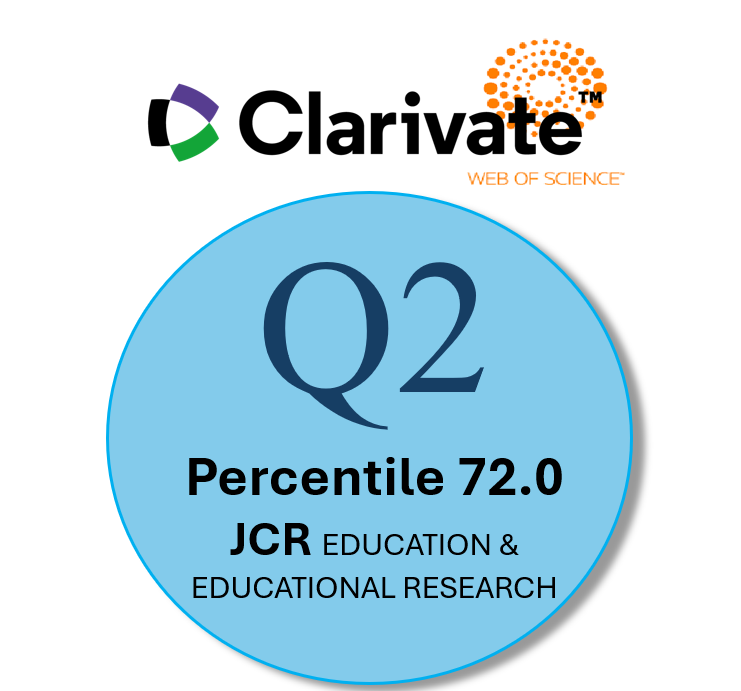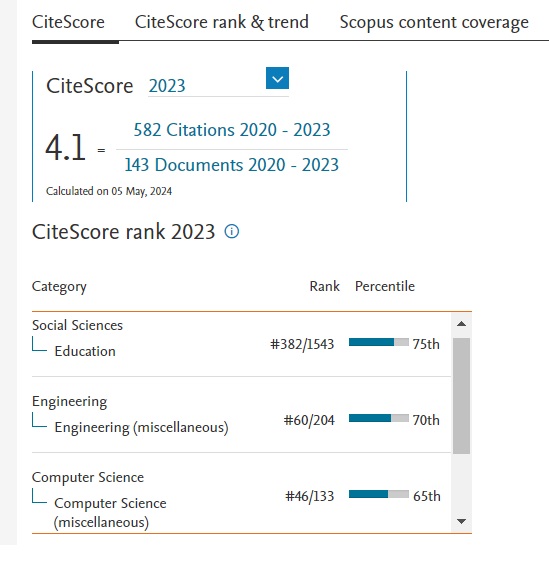El pensamiento algorítmico como estrategia didáctica para el desarrollo de habilidades de resolución de problemas en el contexto de la educación básica secundaria
Resumen
La presente investigación propone una conexión entre las habilidades de pensamiento algorítmico y las habilidades de resolución de problemas con base en un estudio cuantitativo cuasi experimental sustentado en un modelo de regresión lineal múltiple. Los resultados indican que la intervención aplicada tuvo efectos estadísticamente significativos en las habilidades de resolución de problemas en los grupos experimentales y una desmejora en el grupo control; adicional a esto, se determinó una ecuación de un modelo que predice la incidencia de las habilidades de pensamiento algorítmico en la resolución de problemas con un ajuste de modelo del 47,5% (R2). Se concluye con bases empíricas que el pensamiento algorítmico, y las habilidades que le subyacen, descomposición, abstracción y algoritmización, como estrategia didáctica en el contexto de la educación secundaria, incide significativamente en el desarrollo de habilidades en los estudiantes para la resolución de problemas, asunto considerado fundamental para el siglo XXI.
Descargas
-
Resumen4158
-
PDF3535
Citas
Alanoca, J. (2016). Pensamiento Algorítmico en la Matemática de la Enseñanza Básica. Revista Investigación y Tecnología, 4, 01.
Avello, R., Lavonen, J., & Zapata-Ros, M. (2020). Coding and educational robotics and their relationship with computational and creative thinking. A compressive review: Codificación y robótica educativa y su relación con el pensamiento computacional y creativo. Una revisión compresiva. Revista de Educación a Distancia (RED), 20(63). https://doi.org/10.6018/red.413021
Barry, D. M., Kanematsu, H., Fukumura, Y., Ogawa, N., Okuda, A., Taguchi, R., & Nagai, H. (2009). International comparison for problem based learning in metaverse. The ICEE and ICEER, 6066.
Dagienė, V., Sentance, S., & Stupurienė, G. (2017). Developing a Two-Dimensional Categorization System for Educational Tasks in Informatics. Informatica, 28(1), 23-44. https://doi.org/10.15388/Informatica.2017.119
Figueiredo, M., Amante, S., Gomes, H., Azevedo Gomes, M. C., Rego, B., Alves, V., & Duarte, R. P. (2021). Algorithmic Thinking in Early Childhood Education. 9339-9348. https://doi.org/10.21125/edulearn.2021.1885
Futschek, G. (2006). Algorithmic Thinking: The Key for Understanding Computer Science. En R. T. Mittermeir (Ed.), Informatics Education – The Bridge between Using and Understanding Computers (pp. 159-168). Springer. https://doi.org/10.1007/11915355_15
Gal-Ezer, J., & Lichtenstein, O. (1997). A Mathematical-Algorithmic Approach To Sets: A Case Study. Mathematics and Computer Education, 31(1), 33-42.
García-García, J. J., & Rentería-Rodríguez, E. (2013). Resolver problemas y modelizar: Un modelo de interacción. Magis. Revista Internacional de Investigación en Educación, 5(11), 297-333.
George Reyes, C. E. (2020). Percepción de estudiantes de bachillerato sobre el uso de Metaverse en experiencias de aprendizaje de realidad aumentada en matemáticas. Pixel-Bit, Revista de Medios y Educación, 58, 143-159. https://doi.org/10.12795/pixelbit.74367
Gretter, S., & Yadav, A. (2016). Computational Thinking and Media & Information Literacy: An Integrated Approach to Teaching Twenty-First Century Skills. TechTrends: Linking Research & Practice to Improve Learning, 60(5), 510-516. https://doi.org/10.1007/s11528-016-0098-4
Grover, S. (2009, noviembre). Computer Science Is Not Just for Big Kids. Learning & Leading with Technology, 37(3), 27-29.
Grover, S., Pea, R., & Cooper, S. (2015). Designing for deeper learning in a blended computer science course for middle school students. Computer Science Education, 25(2), 199-237. https://doi.org/10.1080/08993408.2015.1033142
Hsu, Y.-C., Irie, N. R., & Ching, Y.-H. (2019). Computational Thinking Educational Policy Initiatives (CTEPI) Across the Globe. TechTrends: Linking Research & Practice to Improve Learning, 63(3), 260-270. https://doi.org/10.1007/s11528-019-00384-4
Israel, M., Wherfel, Q. M., Pearson, J., Shehab, S., & Tapia, T. (2015). Empowering K–12 Students With Disabilities to Learn Computational Thinking and Computer Programming. TEACHING Exceptional Children, 48(1), 45-53. https://doi.org/10.1177/0040059915594790
Iyer, S. (2019). Teaching-Learning of Computational Thinking in K-12 Schools in India. En Computational Thinking Education (pp. 363-382). Springer Singapore. https://doi.org/10.1007/978-981-13-6528-7_20
Jonassen, D. H. (2004). Learning to solve problems: An instructional design guide. Pfeiffer.
Kanematsu, H., Kobayashi, T., Ogawa, N., Fukumura, Y., Barry, D. M., & Nagai, H. (2012). Nuclear Energy Safety Project in Metaverse. En T. Watanabe, J. Watada, N. Takahashi, R. J. Howlett, & L. C. Jain (Eds.), Intelligent Interactive Multimedia: Systems and Services (pp. 411-418). Springer. https://doi.org/10.1007/978-3-642-29934-6_39
Kong, S.-C. (2019). Learning Composite and Prime Numbers Through Developing an App: An Example of Computational Thinking Development Through Primary Mathematics Learning. En Computational Thinking Education (pp. 145-166). Springer Singapore. https://doi.org/10.1007/978-981-13-6528-7_9
Kožuh, I., Krajnc, R., Hadjileontiadis, L. J., & Debevc, M. (2018). Assessment of problem solving ability in novice programmers. PLOS ONE, 13(9), e0201919. https://doi.org/10.1371/journal.pone.0201919
Kye, B., Han, N., Kim, E., Park, Y., & Jo, S. (2021). Educational applications of metaverse: Possibilities and limitations. Journal of Educational Evaluation for Health Professions, 18. https://doi.org/10.3352/jeehp.2021.18.32
Lee, J., & Ko, E. (2018). The Effect of Software Education on Middle School Students’ Computational Thinking. 소프트웨어 교육이 중학생의 컴퓨팅 사고력에 미치는 효과. 한국콘텐츠학회논문지, 18(12), 238-250. https://doi.org/10.5392/JKCA.2018.18.12.238
Lockwood, E., DeJarnette, A. F., Asay, A., & Thomas, M. (2016). Algorithmic Thinking: An Initial Characterization of Computational Thinking in Mathematics. En North American Chapter of the International Group for the Psychology of Mathematics Education. North American Chapter of the International Group for the Psychology of Mathematics Education. https://eric.ed.gov/?id=ED583797
Low, C. S., & Chew, C. M. (2020). Pre-University Students’ Perceptual Flexibility with Mathematical Elements. Mathematics Enthusiast, 17(1), 200-238.
MEN. (2007). Estándares Básicos de Competencias en Lenguaje, Matemáticas, Ciencias y Ciudadanas—Ministerio de Educación Nacional de Colombia. https://www.mineducacion.gov.co/1621/article-116042.html
MEN, M. de E. N. (1998). Lineamientos curriculares Matemáticas. Ministerio de Educación Nacional. http://www.mineducacion.gov.co/1621/articles-89869_archivo_pdf9.pdf
MEN, M. de E. N. (2021, junio 18). Ministerio de Educación emite orientaciones para el regreso seguro a la prestación del servicio educativo de manera presencial en todos los establecimientos educativos oficiales y privados. https://www.mineducacion.gov.co/portal/salaprensa/Noticias/405610:Ministerio-de-Educacion-emite-orientaciones-para-el-regreso-seguro-a-la-prestacion-del-servicio-educativo-de-manera-presencial-en-todos-los-establecimientos-educativos-oficiales-y-privados
MINTIC. (2021, junio 16). Nueva oportunidad para aprender pensamiento computacional: Karen Abudinen, ministra TIC, lanzó segunda convocatoria para docentes. MINTIC Colombia 2020. http://www.mintic.gov.co/portal/715/w3-article-176629.html
Mumcu, H. Y., & Yıldız, S. (2018). The Investigation of Algorithmic Thinking Skills of Fifth and Sixth Graders at a Theoretical Dimension. MATDER Journal of Mathematics Education, 3(1), 41-48.
Nazir, F. binti, Jano, Z., & Omar, N. (2019). Algorithm as a Problem Solving Technique for Teaching and Learning of the Malay Language. e-BANGI Journal, 16(7), 1-12.
Newman, M., & Gough, D. (2020). Systematic Reviews in Educational Research: Methodology, Perspectives and Application. En O. Zawacki-Richter, M. Kerres, S. Bedenlier, M. Bond, & K. Buntins (Eds.), Systematic Reviews in Educational Research: Methodology, Perspectives and Application (pp. 3-22). Springer Fachmedien. https://doi.org/10.1007/978-3-658-27602-7_1
Palma Suárez, C. A., & Sarmiento Porras, R. E. (2015). Estado del arte sobre experiencias de enseñanza de programación a niños y jóvenes para el mejoramiento de las competencias matemáticas en primaria. Revista Mexicana de Investigación Educativa, 20(65), 607-641.
Park, S.-M., & Kim, Y.-G. (2022). A Metaverse: Taxonomy, Components, Applications, and Open Challenges. IEEE Access, 10, 4209-4251. https://doi.org/10.1109/ACCESS.2021.3140175
Pinzón Pérez, D. F., & González Palacio, E. V. (2022). Incidencia de las habilidades de pensamiento algorítmico en las habilidades de resolución de problemas: Una propuesta didáctica en el contexto de la educación básica secundaria. Estudios Pedagógicos, 48(2), 415-433. https://doi.org/10.4067/S0718-07052022000200415
Plerou, A. (2016). Algorithmic Thinking and Mathematical Learning Difficulties Classification. American Journal of Applied Psychology, 5(5), 22. https://doi.org/10.11648/j.ajap.20160505.11
Polit, D. F., Hungler, B. P., Palacios Martínez, R., & Féher de la Torre, G. (2007). Investigación científica en Ciencias de la Salud: Principios y métodos, sexta edición. McGraw-Hill Interamericana.
Rivadeneira, D. X. R., & Toledo, J. A. J. (2019). Incorporación del pensamiento algorítmico en la formación contable. Avances Investigación en Ingeniería, 16(2), Art. 2. https://doi.org/10.18041/1794-4953/avances.2.5445
Rojas-López, A., & García-Peñalvo, F. (2020). Evaluación de habilidades del pensamiento computacional para predecir el aprendizaje y retención de estudiantes en la asignatura de programación de computadoras en educación superior. Assessment of computational thinking skills to predict student learning and retention in the subject programming computer in higher education., 20(63), 1-39. https://doi.org/10.6018/red.409991
Roldán-Segura, C., Perales-Palacios, F. J., Ruiz-Granados, B., Moral-Santaella, C., & de la Torre, A. (2018). Enseñando a programar por ordenador en la resolución de problemas de Física de Bachillerato. Revista Eureka sobre enseñanza y divulgación de las ciencias, 15(1), 1-15. https://doi.org/10.25267/Rev_Eureka_ensen_divulg_cienc.2018.v15.i1.1301
Sánchez Vera, M. del M. (2019). El pensamiento computacional en contextos educativos: Una aproximación desde la Tecnología Educativa. Research in Education and Learning Innovation Archives, 23, 24. https://doi.org/10.7203/realia.23.15635
Shim, J. (2019). A Study on the Level of Algorithmic Thinking of Students in Elementary and Secondary Schools. Journal of Creative Information Culture, 5(3), 237-243. https://doi.org/10.32823/jcic.5.3.201912.237
Stephens, M., & Kadijevich, D. M. (2020). Computational/Algorithmic Thinking. En S. Lerman (Ed.), Encyclopedia of Mathematics Education (pp. 117-123). Springer International Publishing. https://doi.org/10.1007/978-3-030-15789-0_100044
Stephens, W. (2018). Developing Algorithmic Thinking in the Primary and Junior Secondary Years. 2. /scholarlywork/1331882-developing-algorithmic-thinking-in-the-primary-and-junior-secondary-years
Talan, T., & Kalinkara, Y. (2022). Students’ Opinions about the Educational Use of the Metaverse. International Journal of Technology in Education and Science, 6(2), 333-346.
Tlili, A., Huang, R., Shehata, B., Liu, D., Zhao, J., Metwally, A. H. S., Wang, H., Denden, M., Bozkurt, A., Lee, L.-H., Beyoglu, D., Altinay, F., Sharma, R. C., Altinay, Z., Li, Z., Liu, J., Ahmad, F., Hu, Y., Salha, S., … Burgos, D. (2022). Is Metaverse in education a blessing or a curse: A combined content and bibliometric analysis. Smart Learning Environments, 9(1), 24. https://doi.org/10.1186/s40561-022-00205-x
Tonbuloğlu, B., & Tonbuloğlu, İ. (2019). The Effect of Unplugged Coding Activities on Computational Thinking Skills of Middle School Students. Informatics in Education, 18(2), 403-426. https://doi.org/10.15388/infedu.2019.19
Vidal, C. L., Cabezas, C., Parra, J. H., & López, L. P. (2015). Experiencias Prácticas con el Uso del Lenguaje de Programación Scratch para Desarrollar el Pensamiento Algorítmico de Estudiantes en Chile. Formación Universitaria, 8(4), 23-32. https://doi.org/10.4067/S0718-50062015000400004
Zsakó, L., & Szlávi, P. (2012). ICT Competences: Algorithmic Thinking. Acta Didactica Napocensia, 5(2), 49-58.
Derechos de autor 2023 Revista de Educación a Distancia (RED)

Esta obra está bajo una licencia internacional Creative Commons Atribución-NoComercial 4.0.
Las obras que se publican en esta revista están sujetas a los siguientes términos:
1. El Servicio de Publicaciones de la Universidad de Murcia (la editorial) conserva los derechos patrimoniales (copyright) de las obras publicadas, y favorece y permite la reutilización de las mismas bajo la licencia de uso indicada en el punto 2.
2. Las obras se publican en la edición electrónica de la revista bajo una licencia Creative Commons Reconocimiento-NoComercial-SinObraDerivada 3.0 España (texto legal). Se pueden copiar, usar, difundir, transmitir y exponer públicamente, siempre que: i) se cite la autoría y la fuente original de su publicación (revista, editorial y URL de la obra); ii) no se usen para fines comerciales; iii) se mencione la existencia y especificaciones de esta licencia de uso.
3. Condiciones de auto-archivo. Se permite y se anima a los autores a difundir electrónicamente las versiones pre-print (versión antes de ser evaluada) y/o post-print (versión evaluada y aceptada para su publicación) de sus obras antes de su publicación, ya que favorece su circulación y difusión más temprana y con ello un posible aumento en su citación y alcance entre la comunidad académica. Color RoMEO: verde.














